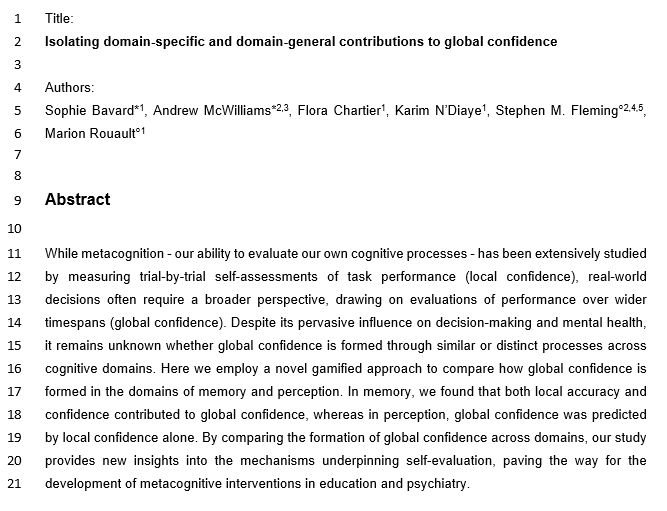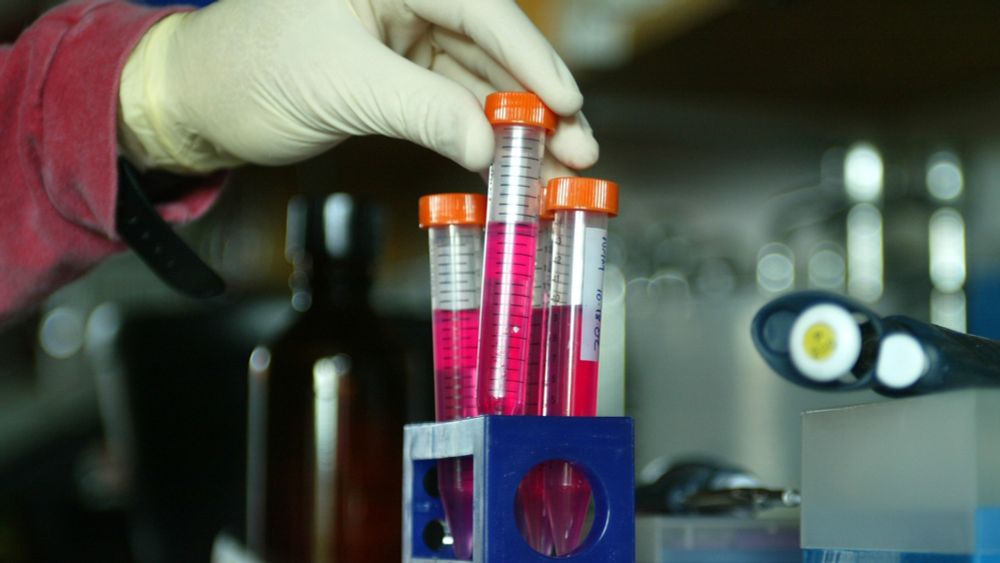
🚨 New preprint! 🚨
Very happy to share our latest work on metacognition with M. Rouault, A. McWilliams, F. Chartier, @kndiaye.bsky.social and @smfleming.bsky.social where we identify contributors to self-performance estimates across memory and perception domains 👇
osf.io/preprints/ps...
13.10.2025 08:08 — 👍 42 🔁 11 💬 1 📌 0
Thought experiments such as the Blockhead and Super-Super Spartans are often taken as “definitive” arguments against behavior-based inference of cognitive processes.
In our review -with @thecharleywu.bsky.social- we argue they may not be as definitive as originally thought.
09.10.2025 12:33 — 👍 2 🔁 2 💬 0 📌 0

🎉 Excited to present a poster at #CCN2025 in Amsterdam!
📍 Aug 12, 1:30–4:30pm
We show that experiential value neglect (Garcia et al., 2023) is robust to changes in how options and outcomes are represented. Also, people show reduced sensitivity to losses, especially in comparative decision-making.
07.08.2025 09:11 — 👍 14 🔁 2 💬 2 📌 1

🔥Our paper PhyloLM got accepted at ICLR 2025 !🔥
In this work we show how easy it can be to infer relationship between LLMs by constructing trees and to predict their performances and behavior at a very low cost with @stepalminteri.bsky.social and @pyoudeyer.bsky.social ! Here is a brief recap ⬇️
24.04.2025 13:15 — 👍 16 🔁 5 💬 3 📌 2
Below the thread about a thoroughly updated version of our human-machine / moral psychology paper where we show the complex nature of anti-/ pro-AI biases in evaluating and detecting machine vs. artificial judgements. Study lead by @bsgarcia.bsky.social in collaboration with Crystal Qian
23.04.2025 12:40 — 👍 2 🔁 1 💬 0 📌 0
If people unknowingly prefer AI judgments (but reject them once labeled) it demonstrates the disconnect between perceived neutrality and the reality of algorithmic influence, highlighting a loss of autonomy to an opaque system and an imbalance of information.
23.04.2025 10:19 — 👍 0 🔁 0 💬 0 📌 0
Why does this matter?
As AI enters legal, medical, and personal decision-making, how people perceive its moral reasoning must be understood.
23.04.2025 10:19 — 👍 0 🔁 0 💬 1 📌 0

💡 Agreement was driven by deeper semantic content.
Terms tied to cost-benefit logic (“save,” “lives”) often triggered disagreement, especially in personal moral dilemmas.
So: detection relied on surface cues, but judgment aligned with meaning.
23.04.2025 10:19 — 👍 1 🔁 0 💬 1 📌 0

📝 Formal language cues (like length, typos, and first-person usage) helped participants detect AI-generated justifications.
But they had little to no effect on agreement.
People spotted the machine from the style, not the substance.
23.04.2025 10:19 — 👍 0 🔁 0 💬 1 📌 0

✍️ We tried “humanizing” the AI (dv2h; purple): shorter responses, added typos, mimicked human tone.
This reduced detection—but not the belief-based bias.
People still agreed with content they believed was human, even when it wasn’t.
23.04.2025 10:19 — 👍 0 🔁 0 💬 1 📌 0

🕺But here’s the twist:
In complex moral dilemmas (personal moral), participants preferred AI-generated justifications—but only when they didn’t know they came from AI.
When they thought a justification was from AI, they agreed less.
So: pro-AI content, anti-AI belief.
23.04.2025 10:19 — 👍 1 🔁 0 💬 1 📌 0

🔍 First, detection.
People could spot AI-generated moral justifications better than chance—especially in morally difficult scenarios.
Still, accuracy stayed below 70%, and many AI responses passed as human.
23.04.2025 10:19 — 👍 1 🔁 0 💬 1 📌 0

This image shows a question from a study on moral judgment and AI detection.
Scenario: A health official decides whether to promote a vaccine.
Blue character says "yes" and justifies it: “because the chance of getting the disease without the vaccination is significantly higher.”
Participants answer 3 questions:
Do you agree with the decision?
Do you agree with the justification?
Do you think the blue character is AI or human?
Participants were presented with moral dilemma justifications, either human or AI-generated. They had to detect the source and say whether they agreed or not ⚖️
23.04.2025 10:19 — 👍 0 🔁 0 💬 1 📌 0

How Objective Source and Subjective Belief Shape the Detectability
and Acceptability of LLMs' Moral Judgments
Basile Garcia (1) Crystal Qian (2) Stefano Palminteri (3)
(1) University ofGeneva, Geneva, Switzerland
(2) Google, DeepMind, New York City, NY USA
(3) d'études cognitives, École normale supérieure, PSL Research University;
paris, 75005, France-
(4) Laboratoire de Neurosciences Cognitives Computationnelles, Institut National de la Santé et
de la Recherche Médicale', paris, 75005, France.
How does thinking something is AI-generated influence agreement—and vice versa?🧠
In our latest preprint (@stepalminteri.bsky.social, Crystal Qian), ~230 people judged justifications from GPT-3.5 and humans across moral dilemmas. osf.io/preprints/ps...
👇
23.04.2025 10:19 — 👍 7 🔁 1 💬 1 📌 1
Our first fMRI in a while where we investigate the neural bases or multi-step Reinforcement Learning and found a clear functional dissociation between the parietal and the peri-hippocampal cortex. More info by Fabien, below
16.04.2025 15:40 — 👍 17 🔁 7 💬 1 📌 0
bioRxiv Manuscript Processing System
Manuscript Processing System for bioRxiv.
🚨 New preprint on bioRxiv!
We investigated how the brain supports forward planning & structure learning during multi-step decision-making using fMRI 🧠
With A. Salvador, S. Hamroun, @mael-lebreton.bsky.social & @stepalminteri.bsky.social
📄 Preprint: submit.biorxiv.org/submission/p...
16.04.2025 10:03 — 👍 23 🔁 9 💬 2 📌 3
Don't be pushed around by the fears in your mind. Be led by the dreams in your heart.
Nein,No,Non,Não, ingen,Hayır,Nie,Tidak,Nee,Nei
🚫DM’s🚫
Cognitive (neuro)scientist, studying the mechanisms of motivation, beliefs, and decisions
Cognitive social scientist. Interested in the social determinants of health from a behavioural science perspective and in #OpenScience | Research fellow at @wzb.bsky.social | PhD in psychology | she/her
JAMA Neurology is a member of the JAMA Network, a consortium of peer-reviewed, general medical and specialty publications.
🌐 JAMANeurology.com
I do a bunch of stuff on github and repack games || Mastodon = @l@toot.cat
https://github.com/driftywinds
https://docs.drifty.win
https://drifty.win
https://enka.network/u/Kuria
Clinical Social Neuroscientist & Psychotherapist @tudresden.bsky.social & head of @kanskelab.bsky.social
https://tud.link/0p4j
Scientist | Collaborative Leadership Consultant for STEM Leaders and Organizations at the BridgUs Lab
PhD candidate studying perception of naturalistic facial expressions across lifespan | Former opera singer | Interested in multimodal communication (vocal/facial) & MSI, affective breathing, interoception 🫁🫀
NY Times Besting Author of the Parkinson’s Plan, Medical Advisor Parkinson Foundation, Author 15 books http://pdplan.org Distinguished Professor and Director of the Fixel, Associate Editor JAMA Neurology, co-founder @DBSThinkTank
Scientific content aggregator with custom content feeds. Science news, jobs, events and more. Sign up at https://www.scientific.today.
Changing how the world thinks. Home to the big ideas and leading thinkers of our time. Subscribe here: https://iai.tv/subscribe
Host of HowTheLightGetsIn Festival 💡
Média indépendant et engagé depuis 1988. Commandez l'hebdo sur Politis.fr, et retrouvez les hors-séries en kiosque. Abonnez-vous à partir de 5€/mois ⬇️
https://buff.ly/4fAm8vz
#data journaliste indépendant #LaRochelle
J'écris chez @reporterre.net, @politis.fr , @vert.eco et autres sur des sujets #eau #mégabassines #pesticides #probité #ESR etc.
Membre de @professionpigiste.bsky.social & @revue-farouest.fr
Blast est un site de presse en ligne d’information générale et une web tv créés par le journaliste Denis Robert. Média libre et indépendant, affranchi de toute pression industrielle ou financière.
Blast-info.fr
Pour nous écrire : contact[at]blast-info.fr
my name is mob
game developer and artist
mobOS devlog server: discord.gg/mzdjxdGNNa
mobOS steam page: https://store.steampowered.com/app/3731270/mobOS/
contact: mob@palmonds.dev
support me: https://ko-fi.com/palmonds/tiers
President of the @ec.europa.eu
Mother of seven. Brussels-born. European by heart. 🇪🇺
Believe in yourself! Work hard, never give up & anything's possible! OR: Kick back, relax & aim low: You'll never be disappointed...😜 I IGNORE ALL DMs!
Retired guessworker.
Still searching for the missing context.
Love LLMs, programming and system administration.
📌 Germany
🌍 https://fry69.dev/ (placeholder)
🧑💻 https://github.com/fry69/
🅿️ https://altq.net/ @altq.net (PDS)
Striving to make computers smarter.
PhD student @FlowersINRIA










